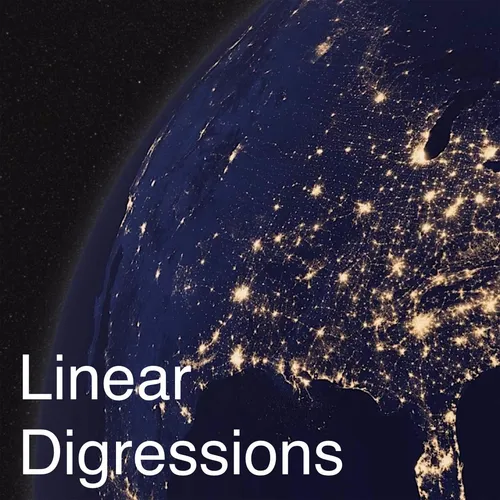
Linear Digressions
In each episode, your hosts explore machine learning and data science through interesting (and often very unusual) applications.
- Update frequency
- every 6 days
- Average duration
- 19 minutes
- Episodes
- 291
- Years Active
- 2014 - 2020

Watson
This machine learning algorithm beat the human champions at Jeopardy. What is... Watson?
00:15:36 |
Tue 25 Aug 2015

Bayesian Psychics
Come get a little "out there" with us this week, as we use a meta-study of extrasensory perception (or ESP, often used in the same sentence as "psychics") to chat about Bayesian vs. frequentist stati…
00:11:44 |
Tue 18 Aug 2015

Troll Detection
Ever found yourself wasting time reading online comments from trolls? Of course you have; we've all been there (it's 4 AM but I can't turn off the computer and go to sleep--someone on the internet i…
00:12:57 |
Fri 07 Aug 2015

Yiddish Translation
Imagine a language that is mostly spoken rather than written, contains many words in other languages, and has relatively little written overlap with English. Now imagine writing a machine-learning-b…
00:12:15 |
Mon 03 Aug 2015

Modeling Particles in Atomic Bombs
In a fun historical journey, Katie and Ben explore the history of the Manhattan Project, discuss the difficulties in modeling particle movement in atomic bombs with only punch-card computers and inge…
00:15:38 |
Mon 06 Jul 2015

Random Number Generation
Let's talk about randomness! Although randomness is pervasive throughout the natural world, it's surprisingly difficult to generate random numbers. And even if your numbers look random (but actually …
00:10:26 |
Fri 19 Jun 2015

Electoral Insights (Part 2)
Following up on our last episode about how experiments can be performed in political science, now we explore a high-profile case of an experiment gone wrong.
An extremely high-profile paper that wa…
00:21:18 |
Tue 09 Jun 2015

Electoral Insights (Part 1)
The first of our two-parter discussing the recent electoral data fraud case. The results of the study in question were covered widely, including by This American Life (who later had to issue a retrac…
00:09:17 |
Fri 05 Jun 2015

Falsifying Data
In the first of a few episodes on fraud in election research, we’ll take a look at a case study from a previous Presidential election, where polling results were faked.
What are some telltale sign…
00:17:46 |
Mon 01 Jun 2015

Reporter Bot
There’s a big difference between a table of numbers or statistics, and the underlying story that a human might tell about how those numbers were generated.
Think about a baseball game—the game stat…
00:11:15 |
Wed 20 May 2015

Careers in Data Science
Let’s talk money. As a “hot” career right now, data science can pay pretty well. But for an individual person matched with a specific job or industry, how much should someone expect to make?
Since …
00:16:35 |
Sat 16 May 2015

That's "Dr Katie" to You
Katie successfully defended her thesis! We celebrate her return, and talk a bit about what getting a PhD in Physics is like.
00:03:01 |
Thu 14 May 2015

Neural Nets (Part 2)
In the last episode, we zipped through neural nets and got a quick idea of how they work and why they can be so powerful. Here’s the real payoff of that work:
In this episode, we’ll talk about a bra…
00:10:55 |
Mon 11 May 2015

Neural Nets (Part 1)
There is no known learning algorithm that is more flexible and powerful than the human brain. That's quite inspirational, if you think about it--to level up machine learning, maybe we should be going…
00:09:00 |
Fri 01 May 2015

Inferring Authorship (Part 2)
Now that we’re up to speed on the classic author ID problem (who wrote the unsigned Federalist Papers?), we move onto a couple more contemporary examples.
First, J.K. Rowling was famously outed usi…
00:14:04 |
Tue 28 Apr 2015

Inferring Authorship (Part 1)
This episode is inspired by one of our projects for Intro to Machine Learning: given a writing sample, can you use machine learning to identify who wrote it? Turns out that the answer is yes, a perso…
00:08:51 |
Thu 16 Apr 2015

Statistical Mistakes and the Challenger Disaster
After the Challenger exploded in 1986, killing all 7 astronauts aboard, an investigation into the cause was immediately launched.
In the cold temperatures the night before the launch, the o-rings t…
00:13:09 |
Mon 06 Apr 2015

Genetics and Um Detection (HMM Part 2)
In part two of our series on Hidden Markov Models (HMMs), we talk to Katie and special guest Francesco about more useful and novel applications of HMMs. We revisit Katie's "Um Detector," and hear abo…
00:14:49 |
Wed 25 Mar 2015

Introducing Hidden Markov Models (HMM Part 1)
Wikipedia says, "A hidden Markov model (HMM) is a statistical Markov model in which the system being modeled is assumed to be a Markov process with unobserved (hidden) states." What does that even me…
00:14:54 |
Tue 24 Mar 2015

Monte Carlo For Physicists
This is another physics-centered podcast, about an ML-backed particle identification tool that we use to figure out what kind of particle caused a particular blob in the detector. But in this case, a…
00:08:13 |
Thu 12 Mar 2015
Disclaimer: The podcast and artwork embedded on this page are the property of Ben Jaffe and Katie Malone ([email protected]). This content is not affiliated with or endorsed by eachpod.com.